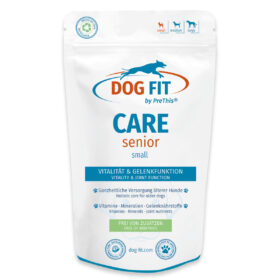Vitamin A for dogs
Vitamin A – Micronutrient for Eyes, Skin and Immune System
Vitamin A is one of the fat-soluble vitamins and is of particular importance for dogs. As a group of various active compounds such as retinol, retinoic acid and retinyl esters, vitamin A contributes to the normal function of vision, skin, mucous membranes and the immune system. Its precursor, beta-carotene, is an antioxidant and can be converted into active vitamin A in the body when needed.
Why is vitamin A so important for dogs?
Vitamin A plays a key role in cell division, the function of the eyes and mucous membranes, and skin regeneration. This micronutrient is particularly well-known for its contribution to maintaining normal vision – especially at dusk. Furthermore, vitamin A supports normal development, blood formation, and the function of the immune system.
Possible signs of insufficient supply
An adequate supply of vitamin A is important for dogs – not only during growth or in pregnant bitches. A deficiency can impair various physiological functions. Possible signs include:
- Visual impairment
- Dry or altered mucous membranes
- Skin irritations
- Delayed wound healing or growth disorders
Since vitamin A is stored in the liver, reserves can compensate for short-term shortages. However, long-term undersupply – for example, due to an unbalanced diet – should be avoided.
Vitamin A and Feeding
Dogs absorb vitamin A through their food. Supplemental intake can be particularly beneficial with lower-quality ready-made food or for special needs in old age. It’s important to note that vitamin A is fat-soluble – its absorption is supported by a balanced diet with healthy fats.

Vitamin A for a needs-based supplement
In our product DOG FIT by PreThis® CARE senior, we use very high-quality vitamin A with high bioavailability. We rely on a high-quality combination of micronutrients – including vitamin A with high bioavailability. The recipe was specially developed to supplement the diet of dogs from the age of 7. In addition to vitamin A, CARE senior contains, among other things, glucosamine and MSM, collagen as well as hyaluronic acid, calcium, zinc and iron – tailored to the nutritional needs of older dogs.
A balanced supply from the start
Even though CARE senior was developed for older dogs, A needs-based micronutrient supplementation may also be beneficial earlier in specific life phases—such as during periods of stress, increased activity, or recovery. Good nutrition lays the foundation for a vital dog life into old age.
5% new customer voucher: DOGFIT
